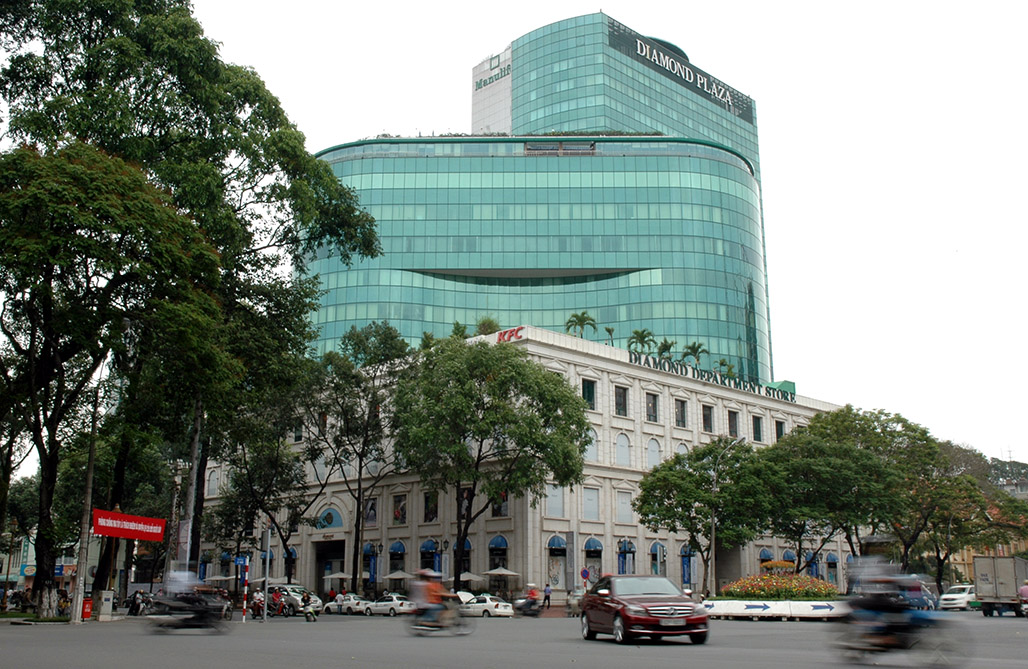As the real estate market is shifting, optimism has emerged given the fresh supply of Grade A office space and some bright spots in the industrial property sector.
Promising Grade A office supply
Sustainable office demand has increased rapidly. In the aftermath of the Covid-19 pandemic, customers seem to prioritize new facilities, focus on green factors with optimized interactions and improved wellbeing conditions, according to the property consulting company Savills Vietnam.
Hoang Nguyet Minh, senior director at Savills Hanoi’s Commercial Leasing, said, “The shift in tenant demand has boosted competition among buildings, piling pressure on rental prices for old buildings which cannot meet environmental criteria.”
Minh noted that green certification for office buildings has almost become a must, prompting local developers to seek ways to maintain the competitive edge of their offers. “Occupiers need to prepare carefully to adapt and find suitable spaces for relocating strategies as well as environmental, social and governance commitments,” she added.
In addition to Singapore, Seoul and Taiwan, Hanoi and HCMC office markets are on the uptrend, according to the Savills Prime Benchmark Report released in January 2023.
However, Grade A office rents in both cities are average compared to other markets. In HCMC, for example, the average gross rent is US$62.4 per square meter, whereas it is US$41.3 per square meter for Hanoi.
Property rent reaches US$96.3 per square meter in Seoul and US$100.5 per square meter in Singapore. As for Hong Kong, the highest rent is US$208.6 per square meter. Savills experts noted that the Grade A rent in Hanoi would slightly rise 3% given the new supply.
However, customers seeking administrative approval for new spaces are facing considerable obstacles, given changes in fire safety regulations. Minh noted that tighter policies on fire safety would make life difficult for many tenants in terms of administrative procedures and rising relocation costs.
Since mid-2021, three official documents on fire prevention and fighting have been promulgated. The frameworks with different standards and technical requirements have replaced and supplemented each other, putting a substantial burden on business operations.
Tighter rules on fire prevention have driven up the cost of businesses’ new office investments. Typically, the rental fee may be agreed upon by the tenant and the property owner in advance, but only after the fire prevention system has been approved, a business can use the space. As a result, the longer the fire safety approval process lasts, the higher cost a business must bear.
Minh said Hanoi’s office market offers several promising projects, including the Capital Place, the 36 Cat Linh and the Taisei Hanoi Office Tower. “Tenants still have many high-quality options in the future,” she added.
Essentially, businesses need to plan early for office relocation, placing project quality and the developer’s reputation as top priorities for consideration. They should reach out to professional consultancy providers for appropriate solutions. By doing so, tenants can avoid unnecessary rental costs, manage risks and choose favored office spaces for long-term development.
Industrial real estate market as a bright spot
Industrial real estate has gained ground in recent years with a substantial inflow of foreign capital. According to the Development Plan of Industrial Parks in Vietnam, the country has 563 industrial parks covering a combined 210,900 hectares. So far, 406 of the planned zones have been established.
Thomas Rooney, senior manager of Industrial Services at Savills Hanoi, said, “Vietnam continues to benefit from foreign investment, has advantages in labor supply and has great opportunities for exporting to the Chinese market.”
He noted that the country’s Economic Risk Index is currently lower than other emerging markets, including Myanmar, Bangladesh, Laos, Cambodia and Malaysia. “Despite unfavorable political factors around the world, the domestic economy is expected to remain stable due to domestic consumption,” said Rooney.
In the long term, however, challenges remain in terms of a shortage of skilled manpower and sluggish infrastructure development.
Rooney said although Vietnam has a strong workforce, many new investment projects and an economy moving up the value chain, the country lacks a sufficient supply of skilled employees.
Therefore, the Government should align the growth of the nation’s skilled workforce with that of other regional markets, both in terms of quality and quantity. “Vietnam needs to focus on applying science and technology and improving the quality of human resources to boost productivity and economic growth in the future,” said Rooney.
He noted that the Vietnamese Government is making efforts to reform the educational system to enhance labor skills and meet market demands. The country has outlined the socioeconomic development strategy for the 2021-2030 period to reform education and improve employment quality. Nevertheless, Rooney noted that it is not something that can be done overnight.

In southern Vietnam, improving the transportation network is at the pinnacle of development. In early January, work on 12 components of the North-South Expressway project began simultaneously. The road has a total length of 729 kilometers, passing through 15 provinces and cities with a total investment of about VND147 trillion.
The North-South Expressway project is expected to become a driving force of regional growth, connecting local provinces and cities and opening up space for development. Compared with other Southeast Asian countries, Vietnam has spent a considerable amount developing infrastructure, accounting for 5.8% of GDP.
Still, there is room for improvement regarding key transportation projects, including highways and deep-water and service ports. “Improving infrastructure is also a mandatory requirement to attract investment with a more convenient transportation system,” said Rooney.
With all things considered, Vietnam has many opportunities to become a magnet for commercial and industrial real estate investments, both domestically and internationally. According to Savills experts, the prospects are rooted in the country’s optimistic economic growth and its rising status in the Asia Pacific region.









